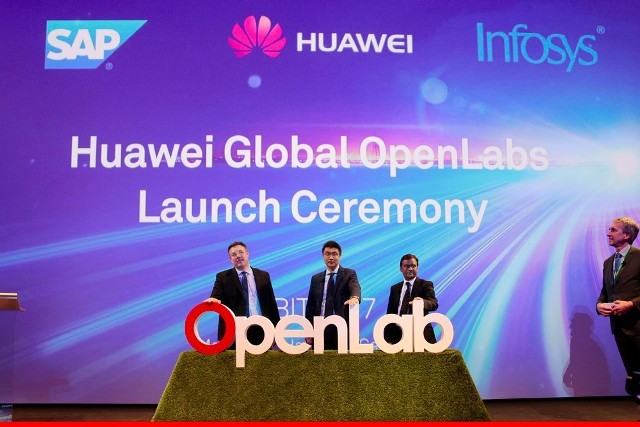Huawei Launches Global OpenLab Program to Create an Open Ecosystem
Investing USD200M to Develop 15 New OpenLabs in 3 Years
[Hannover, Germany, March 20, 2017] At CeBIT 2017 held in Hannover, Germany, Huawei today unveiled its Global OpenLab Program, outlining its development of 15 new OpenLabs and investment plan for the next three years. The new OpenLabs will enable Huawei to work with various industry partners across the world to create customer-centric and innovative solutions that enable digital transformation, while promoting industry ecosystem development.
Global OpenLab Program with USD200M Total Investment in 3 Years
In 2017, Huawei will build 7 new OpenLabs located in cities including London, UK; Paris, France; Moscow, Russia; and Johannesburg, South Africa. This brings the total number of OpenLabs to 12 and by the end of 2019, Huawei plans to increase this number to 20. Over the next three years, Huawei will allocate nearly 1,000 talents around the world and invest a total of USD200 million in the program.

Victor Yu, President of Industry Marketing & Solution Department of Huawei Enterprise Business Group, said: “Each OpenLab addresses the needs of its local market, and harnesses local talent and technology assets. For example in Munich, Germany, we are working on joint innovation projects, conducting simulation tests and researching on connected cars with German automotive enterprises. We work with outstanding local companies to integrate their capabilities into Huawei's global value chain and promote these capabilities across the world, helping to enhance the competitiveness of local ICT industries.”
Huawei has built and operated OpenLabs in 5 cities including Suzhou, China; Munich, Germany; Mexico City, Mexico; Singapore; and Dubai, UAE. These OpenLabs are facilitating joint innovation and solution launches with more than 400 partners across Smart City, finance, transportation, energy, manufacturing and media sectors. Huawei has established partnerships with nearly 80 overseas solutions partners.
Various large enterprises and government departments are implementing solutions developed by Huawei’s OpenLabs. For example, Huawei collaborated with Accenture to develop Smart City solutions; Huawei and Altair joined forces to create an enterprise simulation cloud solution that supports customers in the automotive industry as they digitally transform their research and development arm; and Huawei has also innovated with partners such as SAP and Oracle on power IoT solutions, enabling customers to build strong and cost-effective power grids.
Platform + Ecosystem Strategy Accelerates Digital Transformation with Customers and Partners
The Global OpenLab Program is aligned with Huawei Enterprise Business Group’s ‘Platform + Ecosystem’ strategy. This strategy centers on collaborating with partners and customers to develop innovative, differentiated and leading industry-specific solutions that enable open, elastic, flexible, and secure platforms to drive enterprise digital transformation. Huawei is focused on facilitating a digital transformation ecosystem to implement joint innovations and expand the ecosystem in terms of industry alliances, business alliances, developer platforms, and open-source communities.
“Challenges within a future smart society cannot be tackled alone, they demand cooperation within the ICT industry and with relevant partners. Initiatives such as the Global OpenLab Program demonstrate Huawei’s commitment to providing the building blocks of an ICT ecosystem in this smart society, and driving continuous industrial and social progress through strategic alliances. The Global OpenLab Program will bring together global and regional business partners to boost industry innovation capabilities, and by supporting the greater good of the industry we aim to generate more opportunities for all ecosystem players,” added Yu.
Commenting on its collaboration with Huawei, Rolf Schumann, SVP Global General Manager Platform and Innovation, SAP Cloud Platform, said: “Since 2012, SAP and Huawei have established a strategic alliance, which is based on our complementary software and hardware, and we have cooperated to develop SAP HANA joint solutions and go-to-market (G2M) strategies.
“Huawei has established 5 global OpenLabs that target the enterprise market and have a complete set of equipment to provide potential customers and partners with integrated ICT platforms, enabling joint innovations and proof of concept. SAP believes that these OpenLabs can accelerate cooperation with Huawei in various fields, including Industry 4.0, Advanced Metering Infrastructure (AMI), the Internet of Things (IoT), Big Data, and Business-to-Business (B2B) cloud.”
Infosys has had an alliance with Huawei since 2014. Umashankar Lakshmipathy, Senior Vice President and Regional Head – EMEA, Cloud & Infrastructure Services, Infosys Limited, said: “We have cooperated extensively with Huawei in finance, the IoT and cloud data center solutions, and go-to-market (G2M) strategies. Huawei’s OpenLab in Suzhou provides partners with a leading ICT platform that enables joint innovation of banking and smart stadium solutions. We hope that our joint innovations with Huawei can be expanded to the entire world through Huawei’s OpenLabs in other regions, such as South Asia and the Middle East.”
Huawei is committed to cooperating with its customers and partners in building ICT platforms featuring Cloud, Pipe, and Device collaboration, and orchestrating symbiotic, vibrant, and sustainable ecosystems. Huawei will continue to work with its partners to explore new ways to address digital transformation challenges in the new ICT era.
CeBIT 2017 is held at the Hannover Exhibition Center in Hannover, Germany, from March 20 to 24, 2017. The Huawei booth is located at C30 of Hall 2.

